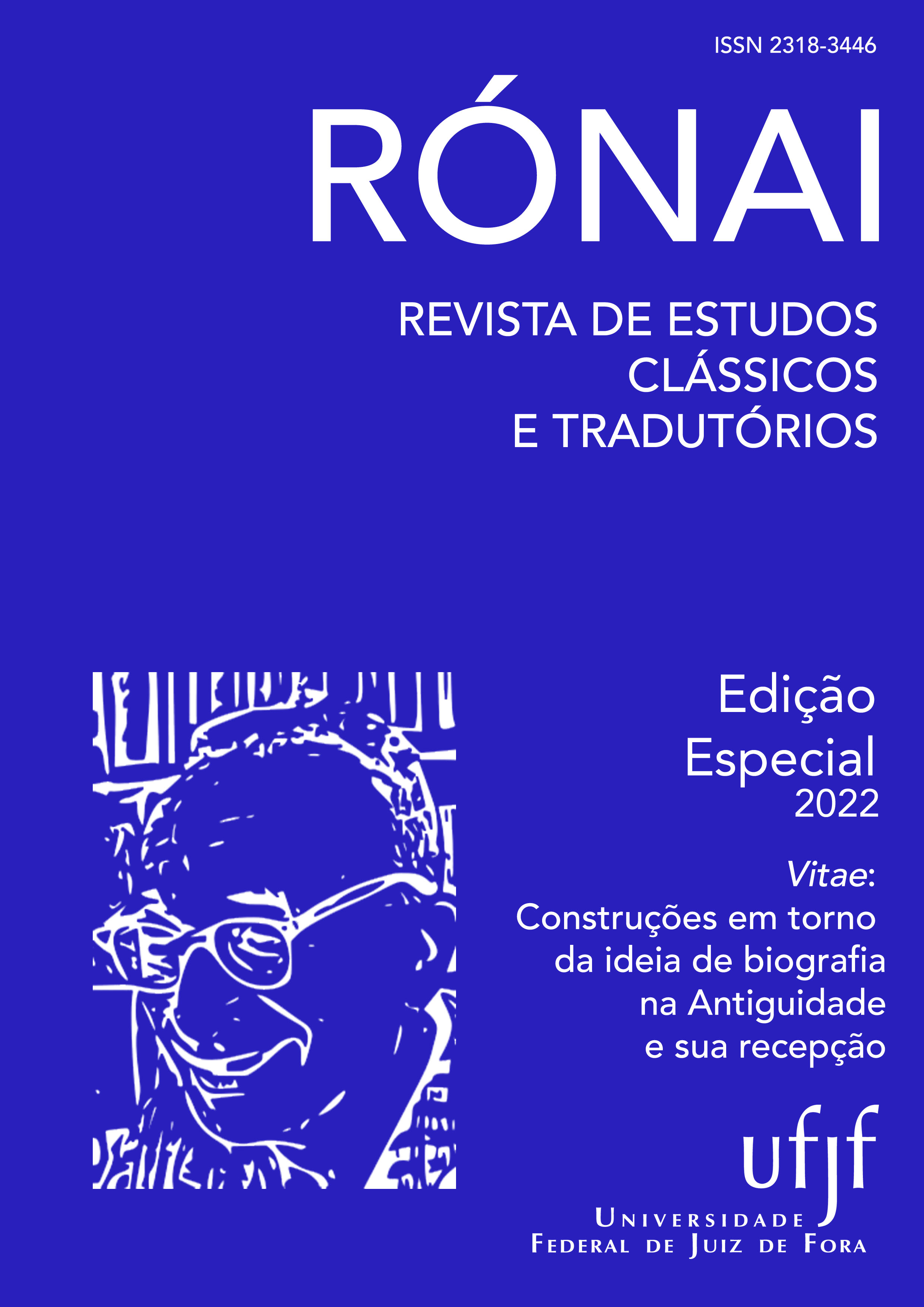The Plutarch’s parallels: Demosthenes and Cicero
DOI:
https://doi.org/10.34019/2318-3446.2022.38441Keywords:
Plutarch, Parallels lives, Demosthenes, Cicero, comparisonsAbstract
The comparisons form a separate set in Plutarch's biographical narrative: since we already know the end of their lives, the criticism of his characters' actions becomes more incisive. However, the comparison (σύγκρισις/sýnkrisis) established by Plutarch serves not only to compare the deeds of those who are his biography objects: the sense of "combination" that the word “comparison” has allows the Greek author to compose parallels that combine characters from different contexts, but with performances that are similar in the political field. The Plutarch’s parallels bring us information and thoughts not always exposed in the biographies of his characters. Therefore, it is important to analyze the comparison between Demosthenes and Cicero, as a case study, to understand its structure and the choices made by Plutarch in the weaving of his narrative. It is also valuable to understand the complexity of his parallels, which were not chosen randomly, all which dialogue with each other on several levels, and are therefore subject to multiple levels of comparison with each other. In this paper, our purpose is to discuss the nature of the Plutarch’s comparisons between Demosthenes and Cicero, observing manifest elements in this composition.
Downloads
References
BENEKER, Jeffrey. The Nature of Virtue and the Need for Self-Knowledge in Plutarch’s Demosthenes-Cicero. In: OPSOMER, J.; ROSKAM, G.; TITCHENER, F. B. (org.). A versatile gentleman consistency in Plutarch’s writing studies offered to Luc van der Stockt on the occasion of his retirement. Leuven: Leuven University Press, 2016, p. 147-160.
BISHOP, Caroline. How to Make a Roman Demosthenes: Self-Fashioning in Cicero's Brutus and Orator. The Classical Journal. Athens, v. 111, n. 2, p. 167-192, December 2015-January 2016.
CHANTRAINE, Pierre. Dictionnaire étymologique de la langue grec – Histoire des mots. Paris: Klincksieck, 1968.
CHRYSANTHOU, Chrysanthos S. Plutarch's Rhetoric of periautologia: Demosthenes 1–3. The Classical Journal. Athens, v. 113, n. 3, p. 281-301, February-March 2018.
DEMOSTHENES. On the crown. Edited by Harvey Yunis. Cambridge: Cambridge University Press, 2001.
JAEGER, Werner. Paidéia: a formação do homem grego. 3. ed. Tradução de Artur M. Parreira. São Paulo: Martins Fontes, 1995.
LARMOUR, David H. J. The Synkrisis. In: BECK, Mark (org.). Companion to Plutarch. Malden/Oxford: Wiley Blackwell, 2014, p. 405-416.
NERDAHL, Michael. Flattery and Platonic Philosophy: The Limits of Education in Plutarch's Life of Dion. Classical World. Cambridge, v. 104, n. 3, p. 295-309, 2011.
PELLING, Christopher. Aspects of Plutarch's Characterisation. Illinois Classical Studies. Champaign, v. 13, n. 2, p. 257-274, Fall, 1988.
PLUTARCH. The life of Cicero. Introduction, translation and commentary by J. L. Mores. Warminster: Aris & Philips, 1988.
PLUTARCHUS. Moralia, vol. 1. W. R. Paton; M. Pohlenz; W. Wegehaupt e H. Gärtner. Leipzig: Teubner, 1993.
PLUTARQUE. Vies. Tome IV. Timoléon-Paul Émile. Texte établi et traduit par Robert Flacelière e Émile Chambry. Paris: Les Belles Lettres, 1966.
PLUTARQUE. Vies. Tome XII. Démosthène - Cicéron. Texte établi et traduit par Robert Flacelière e Émile Chambry. Paris: Les Belles Lettres, 1976.
PLUTARCO. Da educação das crianças. Tradução, introdução e notas de Maria Aparecida de Oliveira Silva. São Paulo: Edipro, 2015.
POLMAN, G. H. Chronological Biography and Akme in Plutarch. Classical Philology. Chicago, v. 69, n. 3, Jul., 1974, p. 169-177.
ROCCI, Lorenzo. Vocabulario Greco Italiano. 37ª ed. Roma: Società Editrice Dante Alighieri, 1993.
SILVA, M. A. O. Plutarco e Roma: o mundo grego no Império. São Paulo: Edusp, 2014.
SILVA, M. A. O. Plutarco Historiador: análise das biografias espartanas. São Paulo: Edusp, 2006.
SWAIN, Simon. Plutarch's Lives of Cicero, Cato, and Brutus. Hermes: Zeitschrift für klassische Philologie. Wiesbaden, vol. 118, n. 2, 1990, p. 192-203.
WESTWOOD, Guy. Plutarch's Aesion: A Note on Plutarch, Demosthenes 11.4. Mnemosyne. Leiden, Fourth Series, v. 70, fasc. 2, 2017, p. 316-324.
XENOPHONTOS, Sophia A. Ethical education in Plutarch. Moralizing agents and contexts. Berlin/Boston: De Gruyter, 2016.
XENOPHONTOS, Sophia A. Imagery and Education in Plutarch. Classical Philology. Chicago, v. 108, n. 2, April, 2013, p. 126-138.
ZADOROJNYI, Alexei V. King of his Castle: Plutarch, "Demosthenes" 1-2. The Cambridge Classical Journal. Cambridge, v. 52, January, 2006, p. 102-127.
Downloads
Published
How to Cite
Issue
Section
License
Copyright (c) 2022 Maria Aparecida de Oliveira Silva

This work is licensed under a Creative Commons Attribution 4.0 International License.
Copyright
The authors of the published contributions agree with the following items:
1. The authors keep the copyright and convey to the journal the right of first publication, the work being licensed under a Creative Commons Attribution License 4.0 International.
2. The authors are allowed and stimulated to publicize and distribute their work online after the publication in the journal, recognizing first publication in this journal.
3. The authors of the approved works authorize the journal to distribute their content, after publication, for reproduction in content indexes, virtual libraries and similars.
For more information about Creative Commons Attribution License 4.0 International, please, go to: https://creativecommons.org/licenses/by/4.0/deed.en
Editorial exemption
The authors of the published contributions are entirely and exclusively responsible for their contents. Its content does not represent an official position of Rónai - Revista de Estudos Clássicos e Tradutórios neither of Faculdade de Letras da Universidade Federal de Juiz de Fora or their partner institutions.



